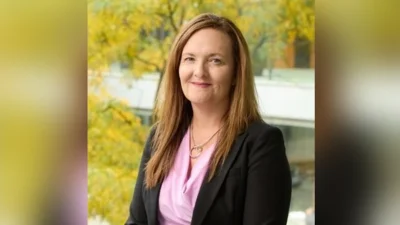Valley Health Shenandoah Memorial Hospital issued the following announcement on Jan. 14
Elena Mullen sees all of her patients in the mornings so she can spend her afternoons in the Critical Care Unit at Winchester Medical Center.
It’s here that she answers call bells, delivers ice water, takes samples to the lab, feeds patients, brings beds to the ICU, and performs other tasks that a certified nursing assistant (CNA) would typically do—except that Mullen is a clinical dietitian.
Mullen is one of approximately 150 Valley Health employees who have volunteered their time to serve as supplemental staff. These employees are trained to serve in needed roles outside their normal positions, often in jobs that directly support nurses during COVID-19 spikes.
“These are my coworkers, and they need help,” Mullen said. “I’m in the trenches with them, and it feels like I’m directly helping them during this pandemic.”
An Extra Set of Hands
During COVID surges, nurses end up treating additional patients and often find themselves stretched thin. Supplemental staffers not only alleviate the needs of these nurses, they can also help prevent burnout.
“Burnout is a hazard in health care even without a pandemic situation,” said Director of Professional Practice Kammie Riggleman. “Our pandemic burnout poses a real threat to maintaining a functioning healthcare team. Without that team, patient care as well as our employees’ health is at risk. Supplemental staffing is one intervention to help mitigate understaffing, which can end in staff burnout. All are welcome to help. Every extra pair of hands is a blessing.”
Non-clinical staff can serve many needs for nurses, doing everything from finding equipment to transferring beds—activities that can often take a nurse away from their patient during a critical time.
“Having extra hands for a bedside nurse who is caring for a patient helps put that nurse back at the bedside,” said Susan Lessar, Valley Heath director of Nutrition Therapy and Integrated Support Services. “It’s important to remember we’re all one team. We’re all able to answer a phone or get water or even fetch some Starbucks. We need to help our bedside nurses because they are caring for our community.”
Dawn Kelly is the print shop coordinator in Shared Services. When she first started as a supplemental staffer, she helped in Nutrition Services by preparing food trays for patients. Now she spends 10-12 hours a week as a volunteer in Environmental Services helping clean discharge rooms by stripping the beds, taking out the trash, wiping down surfaces and remaking the beds.
“I know people are getting overworked and they’re not getting their downtime,” she said. “COVID is taking a toll on everyone. I’m not hospital staff, but this was one of the ways I could help out.”
Original source can be found here.


 Alerts Sign-up
Alerts Sign-up